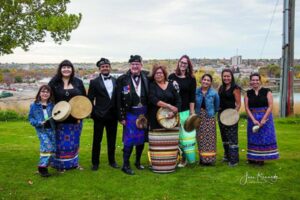Miywasin Moment: Smudging and song on a Scottish Saturday night
By JoLynn Parenteau on October 7, 2021.

Members of the Miywasin Singers and Medicine Hat Burns Club pose after Saturday's performance.--Photo courtesy Joan Kennedy Photography
A toast of ‘Ailte a chairde!’, ‘Welcome, friends!’ in the Scots language, heartily captured the merry mood at the Medicine Hat Golf and Country Club on Saturday evening. The venue hosted the Medicine Hat Burns Club for its annual Robbie Burns dinner in fine fashion. Members dressed in their finest Balmoral bonnets, coattails and kilts, and enjoyed recitations of “poetry that can last until midnight,” said Mayor Ted Clugston of the annual gathering.
Often called ‘Scotland’s favourite son’, Robert Burns, who died of rheumatic fever in 1796 at the age of 37, is celebrated worldwide as the national poet of Scotland. Since 2008, members of the Medicine Hat Burns Club have gathered together to ‘preserve and promote the memory and talents of Robert Burns and all relevant aspects of Scottish culture’.
This year, the club assembled on the back lawn for some distinctly unique entertainment of another culture: the Miywasin Singers. Dressed in traditional Indigenous ribbon skirts and moccasins, the Singers might have looked out of place among the plaid kilts and fine suit jackets, but were warmly welcomed as guests of honour.
To the curious interest of the assembled club members, Miywasin Singers’ Chasity Cairns began with an introduction to the sacred Indigenous practice of Smudging. Indigenous peoples have burned traditional medicines such as sage and sweetgrass for centuries as part of a spiritual ritual to cleanse a person or space, and to promote healing and wisdom.
Cairns, whose spirit name is Misko Bineshe Ikwe, ‘Red Hawk Woman’, explained she would be burning sage, a woman’s medicine, in an abalone shell.
“The abalone shell connects us to water. All Indigenous people are connected to the waters and lands,” she said. “The Eagle flies highest and carries our prayers up to Creator, so we use an eagle feather to send up our prayers with the smoke.
“We smudge our mind to have good thoughts, our eyes to see good in others, our ears to hear good things from others, our mouths to talk good to a person, our hearts for healing, and our bodies so that we may walk with others in a good way.”
Individually the Miywasin Singers hail from all different parts of Canada, traditionally known among Indigenous peoples as Turtle Island. Our Scottish and Indigenous ancestors knew similar histories; of invaders, of hard winters, of long-standing traditions. There is shared history, too. In the 1700s and 1800s, it is conventionally believed that Scottish fur traders introduced bannock (derived from the Gaelic bannach, ‘morsel’) to the Indigenous people of what was then called the New World. Scottish settlers made unions with Indigenous women, the generations that followed belonging to a distinct people called Métis.
Now the Miywasin Singers, of varied Indigenous heritage РM̩tis, Algonquin, Anishinaabe, Blackfoot, Cree, Dakota Sioux, and Saulteaux descent Рcome together collectively to sing and drum, to learn from one another, and to support each other in learning traditional storytelling through music.
This evening, they shared the Strong Woman Song, originally composed by two Anishinaabe women for bravery and comfort, who were held in solitary confinement in an Ontario penitentiary in the 1970s, since closed due to inhumane conditions. For more than 50 years, the song has helped singers to persevere through life’s struggles, to relieve anxiety, to face down fear, to manifest courage.
Robbie Burns wrote much of courage. In his acclaimed battle poem ‘Scots Wha Hae’, Burns wrote:
Now’s the day, and now’s the hour;
See the front o’ battle lour…
By oppression’s woes and pains!
By your sons in servile chains!
We will drain our dearest veins,
But they shall be free!
That sentiment can be heard echoed in modern-day cries for environmental justice by Indigenous land defenders across Turtle Island. Following the first National Day for Truth and Reconciliation, may we all ask Creator to help us walk together in a good way.
A Smudging Prayer
‘Creator, bless me this day
To have good thoughts
To see good things in a person
To hear good things from a person
To talk good to a person
So that I can walk with others in a good way
Thank you Creator’
27
-26
 Members of the Miywasin Singers and Medicine Hat Burns Club pose after Saturday's performance.--Photo courtesy Joan Kennedy Photography
Members of the Miywasin Singers and Medicine Hat Burns Club pose after Saturday's performance.--Photo courtesy Joan Kennedy Photography Members of the Miywasin Singers and Medicine Hat Burns Club pose after Saturday's performance.--Photo courtesy Joan Kennedy Photography
Members of the Miywasin Singers and Medicine Hat Burns Club pose after Saturday's performance.--Photo courtesy Joan Kennedy Photography